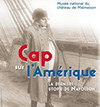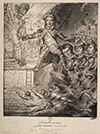| |
| |
EDITORIAL > NAPOLEON FOR AND AGAINST
No historical figure should ever be free from having difficult questions asked about their actions and lives. Napoleon, as we all know, is perhaps the quintessential historical figure in this respect, in that he has been argued over ever since his rise to prominence in 1796. This week's Bulletin adds more detail to the story with Van Ess's even-handed (so he says) version of the events of 18 June 1815. We also have aids for teachers helping them to encourage their pupils to question and study the sources for the iconic battle. 200 Years Ago this week shows Napoleon (and his chosen colleagues) grappling with the issues that would be the stumbling blocks for commentators ever afterwards, namely, how far to go down the line of the French Revolution, or not… For those in Paris (and who are lucky enough to get a seat), Patrice Guennifey will be talking precisely about this question at one of our Cercle Napoléonien talks in May.
Enjoy your read here on napoleon.org.
Peter Hicks
Historian and Head of International Relations, Fondation Napoléon

|
|
|
| |
ARTICLE OF THE MONTH > ACCOUNT OF WATERLOO BY WILLIAM VAN ESS
Willem Lodwyck Van Ess's monumental biography in English, Life of Napoleon Buonaparte, four-fifths of which were published before 1813, is one of the earliest attempts to give an ‘impartial' account of Napoleon's life. Unknown, Willem Van Ess was probably of Dutch origin and “his situation in life […] afforded him the means of observation without enrolling him either among the flatterers or enemies of Buonaparté.” (from the “Advertisement” to the 1808 third edition). His account of Waterloo (published in 1823) therefore stands out amongst early narratives in English because of its largely unpartisan nature.
The French article of the month is Jacques-Olivier Boudon's vision napoléonienne de l'Europe, an article from the Revue du Souvenir napoléonien.
THE FONDATION NAPOLÉON > CERCLE D'ETUDES LECTURE SERIES
The spring programme is now available online (in French), giving information about dates, lecturers, and subjects covered by the next few talks. The first is by Patrice Gueniffey on 6 May, on the theme of Bonaparte et la Révolution française in partnership with the Chaire Napoléon. (link in French, inscriptions open on 21 April).
EASTER HOLIDAY OPENING TIMES FOR THE BIBLIOTHÈQUE MARTIAL-LAPEYRE LIBRARY
From 20 to 30 May, the library will be open on Monday and Tuesday, 13h - 17h, Thursday, 10h - 15h, and closed on Wednesday and Friday.

|
|
|
| |
WATERLOO BICENTENARY > TWO EXHIBITIONS OPEN IN LONDON THIS WEEKEND
Two new exhibitions organised by English Heritage to commemorate the Bicentenary of the battle of Waterloo will open tomorrow, in London. The Wellington Arch will play host to "Waterloo 1815 - The Battle for Peace", an exhibition exploring the build-up, events and aftermath of the battle that changed the face of Europe. Exhibits include the duke's handwritten battle orders, an original pair of ‘Wellington boots', the sword the Duke of Wellington carried at Waterloo and other weaponry used at the battle (external link).
Just opposite the arch, “No 1, London” or Apsley House (as it is known today), the home of the Dukes of Wellington, reopens on 18 April with a new presentation looking at the man behind the battle and giving an insight into the Duke's glitzy social life in London. The display in the Waterloo gallery reveals the scale of banquets held there every year by the Duke to mark the battle. Four new multimedia displays allow visitors to explore the fabulous collection, and a digital portrait by contemporary artist Michael Craig-Martin, ‘The Great Duke after Lawrence', (photo © Stratfield Saye Preservation Trust) commissioned by the 9th Duke, will also be on show. A lecture series completes the activities on offer in May and June.

|
|
|
| |
EXHIBITION > SET SAIL FOR AMERICA - NAPOLEON WHAT IF... (CHATEAU DE MALMAISON, FRANCE)
“Cap sur l'Amérique – la dernière utopie de Napoléon” (from 22 April to 20 July 2015) is an exhibition about Napoleon's thoughts of escaping to America after Waterloo which opens this week at the château de la Malmaison, near to Paris, in France, in the home that Joséphine bought and where Napoleon spent his last days, before taking the long road to exile. The escape to America never happened, but Napoleon did make serious plans, as this exhibition shows. Many have wondered what would have happened had the Emperor reached the other side of the Atlantic. A recent article discusses the question: What if Napoleon had come to America? and another describes How Napoleon nearly became a U.S. citizen. (external links).

|
|
|
| |
WATERLOO RESOURCES FOR TEACHERS
The Waterloo Bicentenary is an occasion to encourage adults and children alike to find out more about history in general, and thankfully the internet provides all kinds of resources for learning. The National Army Museum in the UK has made available online a whole package of material, from quizzes to film guides, Sources, “200 objects” telling the story of Waterloo. And Waterloo 200, in partnership with “Hungry for History”, is challenging school children from across the UK to determine their hundred defining moments in history of the last 200 years from 1815 – 2015 with timeline200. As well as documentaries about the battle of Waterloo easily available online, don't forget our website napoleon.org, which we are constantly enriching.
WATERLOO BICENTENARY > NO THIRD DAY AT WATERLOO
Contrary to the suggestion made a couple of weeks ago in the press, it has now been confirmed that there will NOT be a third day of re-enactments on Sunday 21 June at Waterloo. (external links in French)

|
|
|
| |
200 YEARS AGO > THE ACT ADDITIONAL TO THE CONSTITUTIONS OF THE EMPIRE
In the first days of his return to the Tuileries, Napoleon was forced to come to terms with the proclamations he had made in Lyons on the way back to power before 20 March, 1815, proclamations that had verged on the Jacobin in their opposition to Louis XVIII and his ‘Charte' or Charter. A new constitution was the key, a document that would establish Napoleon as a ‘new and improved' monarch. A special commission was set up to compose the new founding text. And in his desire to show himself as ‘liberal', Napoleon had assembled a group largely composed of moderates, namely, Cambaceres, Maret, Carnot, Regnaud de Saint-Jean-d'Angely, Boulay-de-la-Meurthe, Merlin-de-Douai and Defermon. Napoleon also called on the constitutional trouble-shooting skills of Benjamin Constant, a fierce opponent of the Imperial regime up to its end in 1814, to discuss the matter with him and eventually to draw up the constitutional document (first draft on 15 April), based on Louis XVIII's Charte and on the British constitution. Despite opposition by Carnot, the commission followed Constant's ‘improved Charte' as Chateaubriand called it, with its deliberative chambers, elected by as large a constituency as possible, its hereditary peerage, and its guaranteed rights and liberties. Napoleon however, on many of the points, had the final word, most notably on the confiscation of the property of those who had followed Louis XVIII into exile, and in the title of the document. The name “Act additional to the constitutions of the Empire” was his express wish; it would, he thought, umbilically link the two regimes, despite the reticence of the commission and Constant. By this act alone, Napoleon left himself open to the criticism that in fact nothing had changed, and he had remained the same Napoleon who had led France down into the First Abdication. The ‘Acte additionnel' was finally signed on 22 April 1815 and published the following day.
To see the image (© BnF) “Le double serment; ou, fidélité constante à tout le monde” as well as an interesting article and other sources about Benjamin Constant's collaboration with Napoleon, have a look at the online exhibition: The Last Stand: Napoleon's 100 days in 100 objects. (external link in English)
150 YEARS AGO > INVENTION OF PASTEURISATION
On 11 April 1865, Louis Pasteur filed the patent for a method of wine conservation by heat treatment, a process which later would form the basis for the method known today as “Pasteurisation” (the word - coined from Pasteur's name – was not however to come into usage for another twenty-two years), thereby revolutionising both the food industry and public health. Pasteur had been encouraged in 1863 by Napoleon III to look for a treatment for diseases affecting vines, a major problem at the time (external link). Pasteur drew his inspiration from the work of the engineer and politician Alfred de Vergnette de Lamotte, (who had presented his own research into wine heating for conservation at the Académie des sciences, in 1864). Pasteur‘s method consisted of heating the liquid to between 55 and 60 degrees, thus destroying certain pathogens, without altering flavour. This procedure, though much perfected over the last 150 years, is still used today, not only for wine but for numerous food and drink products such as milk, juice, beer and cheese. To date over 11,700 different methods of pasteurisation have been patented worldwide. In the same year, the British surgeon and naturalist (and a great admirer of Pasteur), Joseph Lister, invented the concept of modern antisepsis, by using carbolic acid to destroy bacteria on an open wound.
To learn more about the involvement of the Emperor Napoléon III in Pasteur's research, see the article “Napoléon III et Pasteur” in French on our website napoleon.org)
Wishing you an excellent Napoleonic week!
Peter Hicks and Rebecca Young (with Syamala Roberts)
THE NAPOLEON.ORG BULLETIN No. 755, 17 - 23 APRIL, 2015
Interested in the work of the Fondation Napoléon? Why not participate, either generally or in a specific project, by making a donation?
© This Napoleon.org weekly bulletin is published by the Fondation Napoléon. Reproduction or all or part of this bulletin is forbidden, without prior agreement of the Fondation Napoléon.

|
|
|
|
|
|
|
|
WATERLOO BICENTENARY 1815-2015
What's on this year relating to the Bicentenary of the Battle of Waterloo: commemorations, books, exhibitions, news ...
WATERLOO > WHAT'S ON (updated 17/4/15)
WATERLOO > SEEN ON THE WEB (updated 17/4/15)
WATERLOO > READING LIST (updated 17/4/15)
Follow us on Facebook and on Twitter!
napoleon.org - related content:
WHAT'S ON (see our website for all events)
Talks
- "Wellington and the French: a family view lecture by Lady Jane Wellesley", British Museum [30/04/2015]
- "Waterloo, Stories of Love, Death and War", talk by Alwyn Collinson, Army & Navy Club, London [30/04/2015]
- Waterloo and Wellington: Lecture Series, Apsley house, London [05/05/2015 - 21/06/2015]
- "Wellington at Waterloo" lecture by Saul David Windsor Castle, UK [06/05/2015]
- 'The News from Waterloo' talk by Brian Cathcart, Muswell Hill, UK [13/05/2015]
- "Battle of Waterloo: A Defining Moment", talk by Paul Chamberlain, Harpenden, Berkhamstead and Peterborough, UK [7/05/2015 and 11/05/2015 and 29/05/2015]
- "The Hundred Days: Napoleon's Road from Elba to Waterloo", talk by Mark Adkin, Army & Navy Club, London [11/06/2015]
- Andrew Roberts and Jenny Uglow talk about Waterloo, Charleston Festival, UK [16/05/2015]
- "Napoleon the Great", lecture by Andrew Roberts, British Museum [19/06/2015]
- Battle of Waterloo Commemorative Walks in London, UK [21/03/2015 - 20/06/2015]
Conferences
- Oswego International War of 1812 Symposium New York, US [17/04/2015 - 19/04/2015]
- Conference: 'Popular Reactions and State Responses to the 100 Days' University of Warwick, UK [07/07/2015]
Exhibitions
- "Waterloo 1815 - The Battle for Peace" at Wellington Arch and new display at Apsley House, London UK [18/04/2015 - 30/12/2015]
- Cap sur l'Amérique - La dernière utopie de Napoléon, Chateau de Malmaison, France [22/04/2015 - 20/07/2015]
- Napoléon et Paris, rêves d'une capitale, Musée Carnavalet, Paris [08/04/2015 - 30/08/2015]
- Le congrès de Vienne, l'invention d'une Europe nouvelle, Musée Carnavalet, Paris, France [08/04/2015 - 30/07/2015]
- Napoléon-Wellington: Destins Croisés,Wellington Museum, Waterloo, Belgium [21/03/2015 - 31/07/2015]
- Waterloo 1815-2015: Visions of war, Bibliothèque Paul Marmotton, Paris, FR [15/04/2015 - 11/07/2015]
- Pie VII face à Napoléon : la Tiare dans les serres de l'Aigle Fontainebleau, FR [28/03/2015 - 29/06/2015]
- 'Alexander, Napoleon and Josephine: a story of war, art and friendship' Hermitage, Amsterdam, NL [28/03/2015 - 08/11/2015]
- Modern Heroism: Printmaking and the legacy of Napoleon Bonaparte Fitzwilliam Museum, Cambridge UK [03/02/2015 - 28/06/2015]
- Wellington and Waterloo: "the tale is in every Englishman's mouth" University of Southampton, UK [13 April -19 June and 13-24 July 2015]
Commemorations
- Living History weekend honouring General Andrew Jackson and the victors of New Orleans - Natchez, Washington, Mississippi [24/04/2015 - 26/04/2015]
- Major Percy victory route (recreated by bike): The Ride of the Lions, Waterloo 200 [17/06/2015 - 20/06/2015]
WATERLOO > WHAT'S ON (updated 17/4/15)
SEEN ON THE WEB (all external links)
- How to bring the battle of Waterloo to life in your classroom
- Video: Napoleon and Paris: exhibition at the Musée Carnavalet
- A gold trinket box presented to Lord Uxbridge famous for losing his leg at the Battle of Waterloo has sold for more than £100,000
- Anne Campbell Dixon explores the history of Wellington Arch, which has just been reopened after a long-overdue restoration
- Exhibition review: ‘Wellington: Triumphs, Politics and Passions' in London
- The man who keeps Napoleon's memory alive on St Helena
- King George III's private papers to go online
- Napoleon and the Easter Insurrection in Corsica
- "Congreso de Viena. Piesa del mes del AHN" Foyer exhibition, Archivo Histórico Nacional, Madrid
"WATERLOO" > SEEN ON THE WEB (link to our website, updated 17/4/15)
THE BIBLIOTHÈQUE MARTIAL-LAPEYRE FONDATION NAPOLEON LIBRARY
The library is normally open on Mondays and Tuesdays from 1pm to 6pm and on Thursdays and Fridays from 10am to 3pm. The library is closed on Wednesdays.
Online database catalogue
Digital Library
Contact
NAPOLEONICA LES ARCHIVES
Site of digitised Napoleonic archival material:
The working papers or 'imprimés' of the Napoleonic Conseil d'Etat, the correspondence of Vivant Denon, etc.
http://www.napoleonica.org
Contact: napoleonica@napoleon.org
NAPOLEONICA. LA REVUE
International peer-review interdisciplinary e-review on the history of the two Empires, bilingual French-English, 3 issues per year, free access.
Read the review on Cairn.info
Contact: napoleonicalarevue@napoleon.org
ACCOUNT DETAILS
To change your email address, unsubscribe, and sign up for the French information bulletin.
Problems with a link in this letter?
- Check the homepage on: http://www.napoleon.org/en/home.asp
- View back numbers of the bulletin: http://www.napoleon.org/en/space/information_bulletin/archive_lettre.asp
- Contact us: information@napoleon.org
|
|






